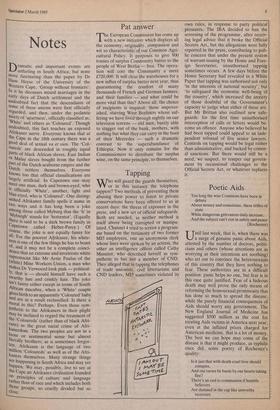Tapping
who will guard the guards themselves, or in this instance the telephone tappers? Two methods of preventing them abusing their power to listen to private conservations have been offered to us in recent days: the threat of exposure in the press, and a new set of official safeguards. Both are needed, as neither method is itself above being corrupted or manipu- lated..Channel 4 tried to screen a program- me based on the testimony of two former MI5 employees, one an anonymous clerk whose lines were spoken by an actress, the other an intelligence officer called Cathy Massiter, who described herself as sym- pathetic to but not a member of CND. They alleged that in tapping the telephones of trade unionists, civil libertarians and CND leaders, MI5 sometimes violated its
own rules, in response to party political pressures. The IBA decided to ban the screening of the programme, after receiv- ing legal advice that it broke the Official Secrets Act, but the allegations were fully reported in the press, contributing to pub- lic concern that under the present system of warrant-issuing by the Home and Fore- ign Secretaries, unauthorised tapping sometimes occurs. A few days before the Home Secretary had revealed in a White Paper that tapping was authorised not only 'in the interests of national security', but `to safeguard the economic well-being of the country', which increased the anxiety of those doubtful of the Government's capacity to judge what either of these are. But Mr Brittan also outlined new safe- guards: for the first time unauthorised interception of calls or letters would be- come an offence. Anyone who believed he had been tapped could appeal to an inde- pendent tribunal of five senior lawyers. Controls on tapping would be legal rather than administrative, and backed by crimin- al sanctions. But there would still be a need, we suspect, to temper our govern- ment by occassional challenges to the Official Secrets Act, or whatever replaces It.














































 Previous page
Previous page